"(Ghost) Riders in the Sky: A Cowboy Legend" is a cowboy-styled country/western song written in 1948 by American songwriter, film and television actor Stan Jones.
"Mrs. McGrath" is an Irish folk song set during the Peninsular War of the early 19th century. The song tells the story of a woman whose son enters the British Army and returns seven years later having lost his legs to a cannonball while fighting against Napoleon presumably at the Battle of Fuentes de Oñoro. The general theme of the song is one of opposition to war. Along with "Johnny I Hardly Knew Ye", it is one of the most graphic of all Irish folk songs that deal with sickness and injuries caused by warfare. Irish folk song collector Colm Ó Lochlainn described "Mrs. Grath" as "known to every true born citizen of Dublin". It was very popular among the Irish Volunteers in the years leading up to the 1916 Rising and has been recorded by many singers and folk groups.

The Chieftains 5 is an album by The Chieftains, released in 1975. It was the band's first album as a professional group. Derek Bell played the tiompan for the first time on the album. It marked the last album appearance of Peader Mercier.

It's Just My Funny Way of Laughin' is a 1962 album by Burl Ives, recorded in Nashville, Tennessee. It rose to No. 24 on Billboard (magazine)'s 1962 Pop Albums Chart. During the same year, the title song, composed by Hank Cochran, reached No. 3 on Billboard's Contemporary Adult Singles Chart, No. 9 on the Country Singles Chart, and No. 10 on the Pop Singles Chart. The title song earned Ives a Grammy Award for Best Country and Western Recording. Another song, "Call Me Mr. In-Between," composed by Harlan Howard, peaked at No. 3 on the Country Singles Chart, No. 6 on the Adult Contemporary Singles Chart, and No. 19 on the Pop Singles Chart.

Christmas Day in the Morning is the first of several Christmas albums by the folk singer Burl Ives. Subtitled Yuletide Folk Songs, this album includes seven traditional Christmas carols, from the well-known "What Child Is This?" to the little-known "Down in Yon Forest" and "The Seven Joys of Mary." "Jesous Ahatonia" is better known as the "Huron Carol." Ives released it as a single under the title "Indian Christmas Carol".

The Versatile Burl Ives! is a 1961 album by Burl Ives, containing his hit single "A Little Bitty Tear." The album reached No. 35 on Billboard's 1962 Pop Album Chart. In the same year, "A Little Bitty Tear" climbed to No. 1 on Billboard's Adult Contemporary Chart, No. 2 on the Country Singles Chart, and No. 9 on the Pop Singles Chart. The pop, country, and folk songs on this album were selected to highlight the folk singer's versatility. Some of his performances, such as his cover of Johnny Cash's "I Walk the Line," represent a significant departure from his earlier repertoire. Ives is accompanied by the Anita Kerr Singers and Owen Bradley's orchestra.

Songs of the West is one of several albums from the early 1960s that signalled Burl Ives's move away from folk music into country western and pop. In Ives's discography this album is immediately preceded by The Versatile Burl Ives! and followed by It's Just My Funny Way of Laughin', two Decca albums containing songs that earned Ives his highest rankings on Billboard's pop, country, and easy-listening charts.

Pearly Shells and Other Favorites is a 1964 album by Burl Ives, produced by Milt Gabler and directed by Owen Bradley. Featuring songs composed by Harlan Howard, Merle Kilgore, Tillman Franks, Mel Tillis and Freddie Hart, among others, the album reached No. 65 on Billboard's 1965 Pop Album Chart. The title song, "Pearly Shells," reached No. 60 on Billboard's 1964 Pop Singles Chart. Greg Adams of Allmusic writes, "Don't let the shortage of well-known songs keep you away from this delightful and well-crafted album."

That'll Be The Day is the second and final studio album from Buddy Holly. Decca, Holly’s first major record label, after failing to produce a hit single from Holly’s early recordings, packaged these 1956 tunes after he had some success with recordings from the Brunswick and Coral labels, especially the previously released single "That'll Be the Day". This is the last album released before his death in a plane crash on February 3, 1959, and is rare among collectors.

Contemporary folk music refers to a wide variety of genres that emerged in the mid 20th century and afterwards which were associated with traditional folk music. Starting in the mid-20th century a new form of popular folk music evolved from traditional folk music. This process and period is called the (second) folk revival and reached a zenith in the 1960s. The most common name for this new form of music is also "folk music", but is often called "contemporary folk music" or "folk revival music" to make the distinction. The transition was somewhat centered in the US and is also called the American folk music revival. Fusion genres such as folk rock and others also evolved within this phenomenon. While contemporary folk music is a genre generally distinct from traditional folk music, it often shares the same English name, performers and venues as traditional folk music; even individual songs may be a blend of the two.

Home Again! is the fourth studio album American folk music artist Doc Watson, released in 1966.

Folk Songs of the Hills is Merle Travis's classic collection of traditional songs from his native Muhlenberg County, Kentucky, including original compositions evoking working life on the railroads and in the coal mines. Each song, accompanied by Travis on his own acoustic guitar, is introduced by a short narrative. Because of these characteristics, the album can be considered an early example of the concept album in popular music, along with Woody Guthrie's Dust Bowl Ballads and Frank Sinatra's In the Wee Small Hours. First issued as a 78 rpm box set album in 1947, this collection has remained in print in LP and CD reissues up to the present, with additional tracks from the same period added in later editions.
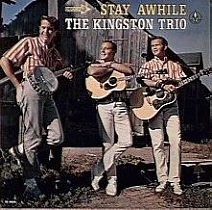
Stay Awhile is an album by the American folk music group the Kingston Trio, released in 1965. It was their second release on the Decca label. It continued their downward slide in the charts, reaching number 126 on the Billboard Pop Albums chart. The single "Yes I Can Feel It" b/w "Stay Awhile" did not chart.
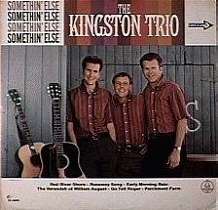
Somethin' Else is an album by the American folk music group the Kingston Trio, released in 1965. It was the first Kingston Trio principal album to miss the charts completely. The lead-off single was "Parchment Farm" b/w "Runaway Song".

Children of the Morning is an album by the American folk music group the Kingston Trio, released in 1966. It was their last album on the Decca label. Three singles were released from the album and all were commercial flops, as was the album. The singles were: "Norwegian Wood" b/w "Put Your Money Away", "The Spinnin' of the World" b/w "A Little Soul is Born" and "Lock All the Windows" b/w "Hit and Run".
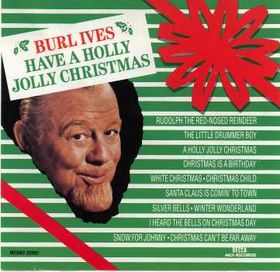
Have a Holly Jolly Christmas is a Christmas album by American folk singer Burl Ives, first released by Decca Records in October 1965.
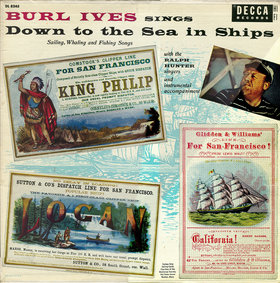
Down to the Sea in Ships was released in 1956 as a 331⁄3 RPM album under the Decca record label. Burl Ives and the Ralph Hunter Singers perform classic sea shanties.

Burl Ives Sings... For Fun is a 1956 album by American folk singer Burl Ives.
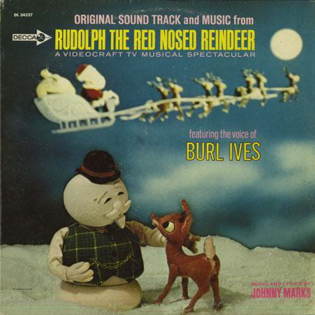
Rudolph the Red-Nosed Reindeer is a soundtrack album to the 1964 Rankin/Bass television special of the same name. The original cast recordings from the TV special are supplemented with instrumental versions recorded by the Decca Concert Orchestra. All songs used in the television special were written by Johnny Marks.

















